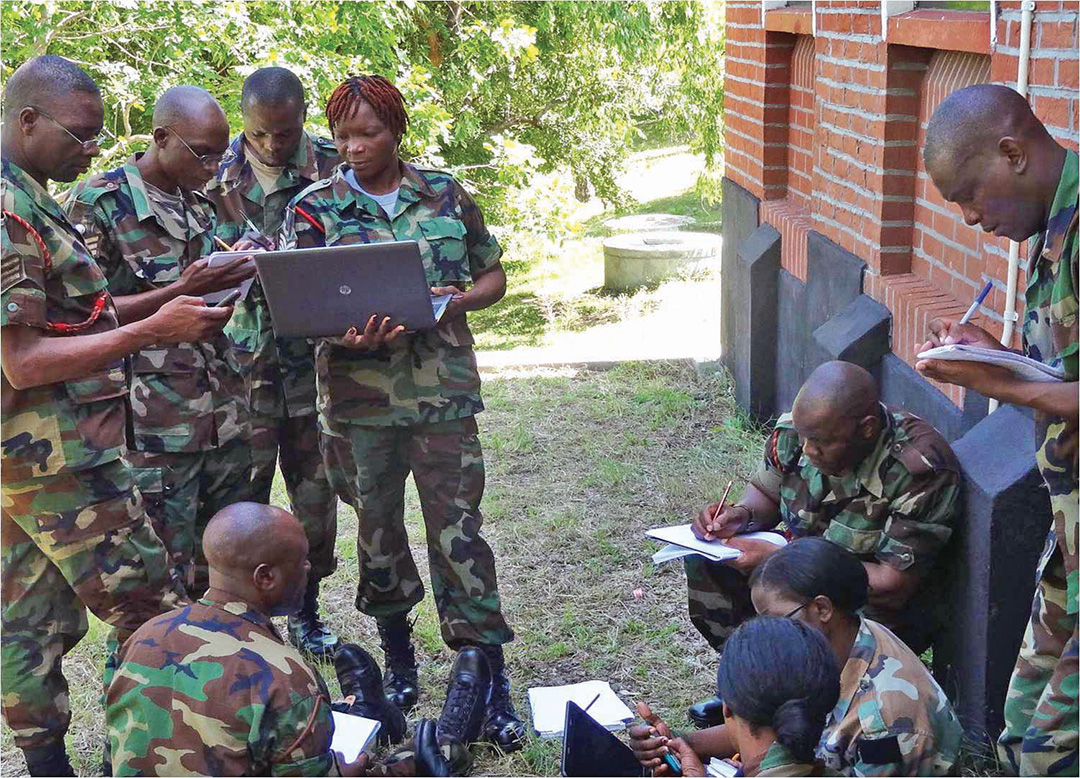Malawi Leads Way With Sergeant Major Academy
ADF STAFF
The Malawi Defence Force (MDF) added a new dimension to the education and training of noncommissioned officers (NCOs) after realizing that there was a gap in leadership development and professional military education between senior NCOs and commissioned officers.
With help from the United States, the MDF established its Sergeant Major Academy in 2014 under the auspices of the Malawi Armed Forces College (MAFCO) in Salima, said Brig. Gen. Swithun Mchungula, commandant at the college.
“The NCO academy was necessary because it prepares and improves the NCO leadership roles in joint operations, multinational operations as well as the ability to work at brigade up to corps levels,” Mchungula told ADF. “It prepares the NCO to think beyond the tactical level … at the operational and strategic levels.”
In Malawi, the role of NCOs had been confined to advising immediate commanders, and training troops in weapons, drills and field craft. “The role was more confined to routine tasks,” Mchungula said. “All along they were not exposed to what I would term as mission command-oriented thinking. They were told what to do and how — more or less spoon-fed. The contemporary NCO is now required to be told what to do, but he must be professionally competent to know how. The responsibility is growing, and he is expected to know what the officer is doing.”
The academy has helped build trust between officers and NCOs. “I think one of the weaknesses before the NCO academy was opened was that the officer corps kept on being trained, and the NCO corps was not being trained,” Mchungula said. “As such, there was no shared leadership, because there was no trust of NCOs because the officers thought the NCOs could not think critically. They also thought NCOs could not command effectively.”
Personnel from U.S. Army Africa came to the college in 2014 to introduce and teach the sergeant major course, which forms the backbone of Malawi’s NCO instruction today. The first class had 30 Malawian NCOs, including Lt. Linda Chikondi, a warrant officer 2 when the course began. She finished at the top of her class, was immediately promoted to warrant officer 1 and was chosen to be one of seven NCOs to teach the course to others. She later became a lieutenant and served as course coordinator until June 2017, when she moved to MDF headquarters.
The course covers a broad range of topics, including stress management, mission command, leadership, integrated military concepts, research methods, information technology, communication skills and international humanitarian law.
Chikondi told ADF the course gives participants critical-thinking skills and helps build the “moral courage” for NCOs to engage effectively with commissioned officers. Often, when young commissioned officers enter the service, they are surrounded by NCOs who have many years of experience. The course helps NCOs feel comfortable advising officers.
Information from the sergeant major course has been used to augment other NCO courses taught at MAFCO, Chikondi said. For example, counseling and suicide prevention instruction has been added to a platoon sergeant course and a section commander course.
As of spring 2018, the sergeant major course had been offered seven times to more than 200 students. Students have included visiting personnel from Kenya, Lesotho, Mozambique, Namibia, Nigeria, Rwanda, Swaziland, Tanzania, Uganda, Zambia and Zimbabwe.
Mchungula said demand to attend the course has steadily increased among other nations on the continent. Because the academy does not have its own buildings or campus, the academy must balance its offerings to avoid conflicting with other courses at the college. Despite these challenges, Mchungula hopes to have an independent NCO academy that can contribute to African leadership development.
“As we always say in the military, NCOs are the backbone of the military,” he said. “We at MAFCO believe that the best way to strengthen this backbone is by providing them with high-caliber education — upgrade their thinking from the tactical level to the strategic level. We must remember NCOs who understand their role in command are able to contribute toward effectiveness in command. The NCOs have a primary job to train and nurture their Soldiers, and that can be attained if we have well-trained, professional NCOs.”


Comments are closed.